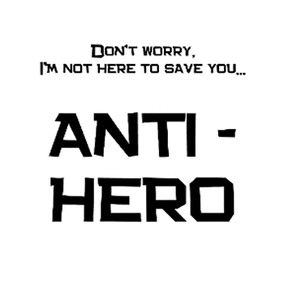
(This article may contain spoilers)
There is such an attraction to anti-heroes when they crop up in our movies. No longer do we want to see golden boys with glimmering locks and abs saving the day. We want the gritty realism. We want to invest in a character that dances over the lines of right and wrong. Sometimes, we want them to plummet head first into the "arsehole" category because you can even say "tragic backstory."
There is something about these anti-heroes that gets us all. Whether its because we relate to the issues that have pushed them to breaking point or we like to get lost in the bat-shit insanity and fantastical world they have built up; with the safety of our own mundane lives when the credits roll. Either way, anti-heroes have been dominated a lot our movies. The I'm With Geek film team have rounded up their favourites, flicking a cigarette at the side-walk and muttering raspy anecdotes to the victims of our pain.
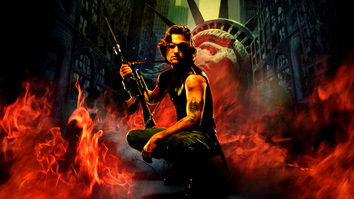
Paul Costello
Anti-heroes are who they are because they represent a thorn in the side of a society that wants them to be a certain way, to do what they're told, to play by certain rules. These characters have looked at the system and found it to be, well, not to their taste. Some will try to exist within society and make a small difference from within it. Others choose to live outside of it... others like Snake Plissken.
From the few bits of backstory we get from Escape from New York and Escape from L.A., we find that Plissken was once a "good" man. A damn good soldier, brave and true, the Plissken of old is the quintessential hero... but then the system happened. A system he helped protect. By the time we meet Plissken, he's a sneering ball of resentment, living outside of society as a criminal and hired gun.
The thing with Plissken is that he actually is still a good man. He's still a good soldier, a fighter of injustice. Unfortunately, this new society has re-defined what "good" means, and it no longer includes him. Only when they need help do they try and get him back, appeal to his sense of patriotism or just straight up threaten to kill or imprison him.
When those that know Snake run into him, the first thing they always say is that they thought he was dead ("What happened in Cleveland?"). The man is a survivor above all else and, as many come to learn, the last thing you do is threaten someone like Snake Plissken.
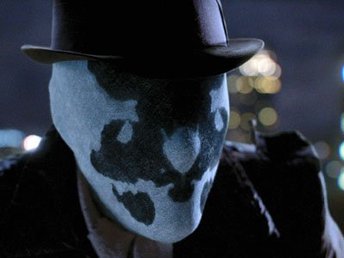
Max Bosshart
Walter Joseph Kovacs, better known as Rorschach is the last remaining masked vigilante in the alternate timeline 1985 of the Watchmen.
The Watchmen is a comic book mini-series written by Alan Moore and adapted to film in 2009, directed by Zack Snyder. In the film Rorschach is portrayed by Jackie Earle Haley. Rorschach was born of a prostitute and spent much of his childhood in a group home for troubled youth. He later took employment at a garment factory. It is while employed here that Kovacs became Rorschach due to the murder of Kitty Genovese. The murder, an actual event in which the witnesses were said to be ambivalent and unresponsive to what transpired, triggers Kovacs. He modifies a special garment, that he claims was ordered by Genovese, into the shifting ink blot mask that gives him his new name Rorschach.
Of the group of of heroes in the Watchmen, Rorschach is by far the most violent, almost sadistic, and psychotic of the bunch. The best way of representing just who Rorschach is through his line, “none of you seem to understand, I'm not locked in here with you, you're locked in here with me.” This comes from a scene, after he is put in prison, in which another inmate attempts to attack him and Rorschach burns the inmate's face with hot frying oil. This, in turn, will later cause a riot, showcasing the sadism and chaos that truly seems to follow Rorschach.
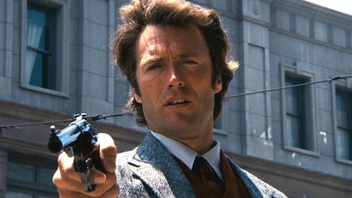
Paul Costello
There were several names thrown around for the casting of Harry Callahan (Frank Sinatra, Marlon Brando, Burt Reynolds), but if we're honest, no one could have done this one but Eastwood. The cinematic legacy of anti-heroism, the affinity for guns, the look of a guy who'll knock your teeth out for crossing the line... all pure Eastwood.
And Callahan is a hell of a character. A cop is meant to be the force for the Law, standing for what's right, setting the standard, protecting innocence, almost the very definition of Hero. However, criminals have no rules, so how can police officers fight them? Well, in the words of another nutcase cop, "Send a maniac to catch a maniac." Harry Callahan sets a standard all right, for the type of right-wing fantasy cop who will match the bad guy for brutality and violence. Some of the films even go on to challenge his standpoint as the lone sheriff cleaning up the town by having him confront those who use similar tactics (aren't the cops in Magnum Force simply doing what he does? Aren't Jennifer's actions in Sudden Impact justified?).
Like most anti-heroes, Callahan sees the value in society. He wants that promise of a good land filled with good people to come true, and he's willing to do anything to make that happen. Perhaps it hasn't even occurred to him that if his mission to eradicate all crime was completed, his methods would ironically mean that he had no place in that new world. Doesn't matter, really. For his time and place, he's the unstoppable force that fights the good fight with dirty tactics... and, dammit, he gets results.
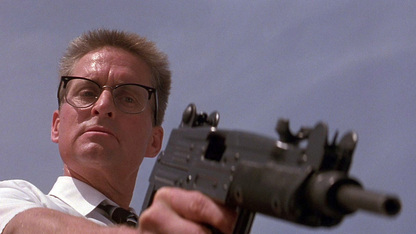
Paul Costello
What makes Michael Douglas's character from Falling Down so interesting as a protagonist is that a lot of people, if not most people, regard his actions as almost completely justified... from a certain perspective. Like most vigilantes, he has finally reached the point where he refuses to accept the circumstances he has found himself in. And like other anti-heroes, he believes that what he is doing is needed. Like when Travis Bickle spoke of the need for a "real rain" to clean the streets, D-FENS is his own cleansing tide washing through the streets of Los Angeles.
Unlike most anti-heroes, though, what sets him apart from the likes of Bickle, Harry Callaghan or Paul Kersey is that most of his targets aren't major criminals. The ones D-FENS goes after are the people and institutions that make life just that little bit harder to live for everyone else. The convenience store that charges too much, the construction workers who cause huge traffic jams for no perceivable reason, the burger joint that refuses to give you what you want because you're two minutes late.
Not everyone has had first experience with real criminals. Not everyone has been mugged, beaten, or worse. Everyone has had experiences with these situations. They're part of the struggle of daily life, the minor inconveniences that hinder your day, making things just that little bit harder for everyone else. It's hard to root for someone like D-FENS who finally decides he won't take it anymore.
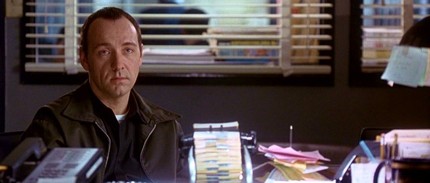
Paul Costello
The easiest definition of an anti-hero is the "sympathetic bastard". They may do things that are bad, behave in ways we find distasteful or even utterly terrible, but they are drawn in such a manner that, whilst we may not agree with their actions, we can understand them or, at the very least, feel some sympathy as to why they do bat they do. Verbal Kint of The Usual Suspects could probably be the dictionary definition of that type of character.
Let's tackle this point head on: Verbal Kint is, in the vernacular so often repeated in the movie, a cripple. Yes, he is much more than that - funny, chatty, ballsy and very, very smart - but his cerebral palsy is the most striking thing about him. The manner in which he deals with everyone in the film is always filtered through this ailment. Indeed, he plays on it. People are only too willing to remind him of his status as a handicapped criminal who needs others to help him at every turn. Even the police make fun of him for his disability.
It's hard not to feel sympathy for Verbal as his story progresses. He's bullied constantly, threatened by everyone he meets, reduced to tears as his interrogator tells him that the only reason he has a friend is because he's so easily led, so happy to be included, that he's nothing but a "stupid cripple." Basic common decency should have you rooting for him, wanting to tell the cops to back off and give the poor guy a break. Hasn't he suffered enough?
And that's exactly how Verbal Kint gets you...
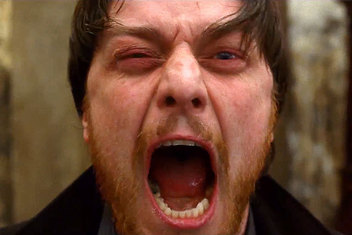
Cookie N Screen
It seems that audiences this year wanted to get a little bit Filth in their cinema viewing, when the film adaptation of Irvine Welshs "unfilmable" novel hit our screens. Directed by Jon. S Baird, Filth takes the once blue eyed heartthrob James McAvoy, adds a couple of pounds on him, a grotty beard and a personality that makes you squirmy.
Bruce is misogynistic and bigoted, sexually depraved and drug addled; every bit of an evil bastard as you'd expect from such a dirty title. From the moment Bruce farts his way on screen, his deplorable antics fill you with rage that makes you sick to the stomach. He pounds his way through women and drugs; turning his friends upon each other so he could seem like the hero, getting the promotion he believes will hold his marriage together. There is not much to like about Bruce, you'll hate him the moment he swaggers onto screen spouting his poorly misguided judgements in a rolling inner monologue of hate.
But what the team here do is turn all this upon Bruce and actually, take you down to wormhole of understanding. They aren't asking for forgiveness of Bruce's action or truly justify how he acts, but Bruce becomes appealing because you see through him. All of his misplaced hate is a wall he has built up so that people don't see how complete insane he is or terrified he has become. This is a man on the verge of breaking down and we can't help but sympathise with the crack and flaws in his plan. You hate to love him, love to hate him and it is completely fascinating to watch this man cling on at the brink of losing it all. It is one of the best performances McAvoy has done and indeed a character that perhaps the world will never be ready for.
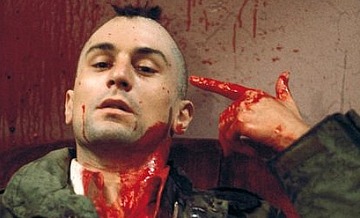
Paul Costello
Some anti-heroes are not a part of normal society by choice. They know that it has rules to live by and, for whatever reason, they don't agree with them and so choose to live apart from it all. Other anti-heroes rest apart from normal society not by choice, but because there exists in them something that naturally separates them from others. They are somehow incapable of being part of the group, even if they want to be. They are aliens amongst their own people. They are the outsiders. They are like Travis Bickle.
The protagonist of Taxi Driver was written by Paul Schrader at a very low point in his life, when he himself drove a taxi at night to make ends meet and spent his existence observing the disturbing nightlife play out in front of him. He was distant, apart, lonely, and so Travis Bickle became the primary example of Schrader's regular fixation: God's Lonely Man.
Alienation is something we can all feel from time to time. That feeling of being lost in the morass of modern living. Travis Bickle lives in that headspace. A war vet, already suffering from post-traumatic stress, his burden is made heavier by his apparent inability to fit in, something he has always struggled with. He doesn't recognise the world, doesn't know how to interact, and that alienation turns him bitter, seeing immorality everywhere. He needs a way out, and when he meets a child prostitute, he sees his opportunity. He wants to do good, wants to be squared away, wants to live a normal life as an accepted member of society. Who hasn't felt the need for that kind of vindication in the dark points in their life?
Travis comes to see Society as both his enemy and his ultimate prize. The tragedy of this anti-hero, like most others, is that in destroying the society that surrounds him, he becomes unacceptable to the society he wants.
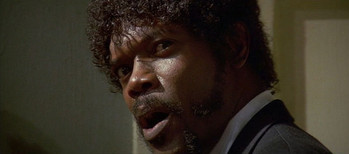
Max Bosshart
Jules Winnfield, portrayed by Samuel L. Jackson, is a supporting character in Quentin Tarantino's film Pulp Fiction. Jackson received an Oscar nomination for Best Supporting actor for the role.
Jules is one half of a hitman duo of gangster Marsellus Wallace. The two are tasked with taking out a man who has crossed Wallace and retrieve a briefcase. Jules Winnfield is a calm and very spiritual, having memorized the Bible passage Ezekiel 25:17, reciting it twice within the movie. Jules appears in three of the seven clips within the movie. In these clips he proves to be the level headed guy, able to diffuse situations and solve problems. He is the foil to the more inept, hot headed Vincent Vega. When Vega creates a problem, like his accidental shooting of Marvin, Jules finds a way to solve the problem. Though the best way to sum up just who Jules is, is the from the part The Bonnie Situation.
While Jules and Vega are in the apartment of the man they were sent after, another bursts out of the bathroom and shoots wildly at them. Due to the fact that all the bullets missed, and the bullet holes appear to be directly behind as if the bullets passed harmlessly through them, Jules feels God intervened and takes it as a sign. Samuel L. Jackson does a great job with the role0; outshining much of the cast, including the leads John Travolta and Bruce Willis.
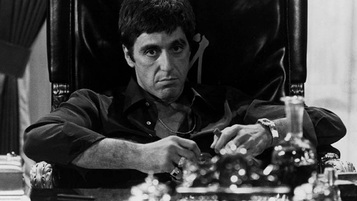
Cookie N Screen
You may have seen this character before. In fact, if you have entered teenage boys (or indeed any age male or movie fan) will have a poster of him on the wall. Tony Montana is the legendary fou are ace of Brian De Palmas 1983 remake of Scarface (yes, remake.)
Scarface, for those who don't know, is about drug trafficking in Miami and Montana's rise from refugee to drug lord. His despicable rise to fame, as portrayed by Al Pacino, is a fantastic watch. Montana lives in this world of crime, sprinkling cocaine on his cornflakes and showing his rivals just who is boss in the nose candy business. He crescendo scene involves a machine gun, a few memorable quips, a whole lot of drugs and a lot more deaths; all because of this guy.
Al Pacino is iconic in this role and despite his, well, attempted Cuban Accent, has been the poster boy for anti-heroes since the movie came out. He is nasty and unforgiving especially if you kill his gang or get him to murder kids, (he doesn't kill kids.) Montanta is grandiose, proof that crime doen't pay no matter how glamorous it may seem.
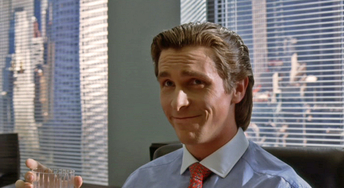
Cookie N Screen
Anti heroes; there are lots of reasons to love and hate them. Maybe they were pushed too far, broken by a corrupt society. Maybe they live by their own rules, outcast by everything with no one to set them straight. Perhaps they have a cleverness that attracts you to them or make you sympathise with their story as they try desperately to weather their history.
And then there is this bastard. Patrick Bateman, American Psycho.
Patrick Bateman is your typical yuppie. An investment banker by day, he argues over business card colouring, invests deeply in a fitness and beauty regime, takes cocaine and has a vapid but gorgeous finacee des spite them both conducting numerous affairs. At night, he kills and he kills a lot. Bateman is the type of guy you can't stand. He is constantly critical of everyone around him, trying desperately to not only fit in but exert his dominance in his field. He also has an inexplicable taste for murder and will kill at any slight irritation or half way through sex just because he likes to do it.
Of course, if you have watched the movie, you'll know that this could all be in his head. This doesn't make him any more likeable.
What makes us watch it is because he is so abhorrent, but played by Christian Bale, he is so charming and charismatic whilst doing it. It is almost ridiculous as to how much fun you can have watching American Psycho, as Bateman monologues about popular culture just before hammering an axe into someone's head. It's a deplorable yet entertaining film and character.
Is your favourite anti-hero missing? Let us know in the comments!

 RSS Feed
RSS Feed
